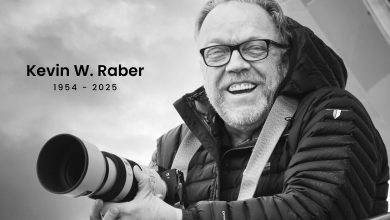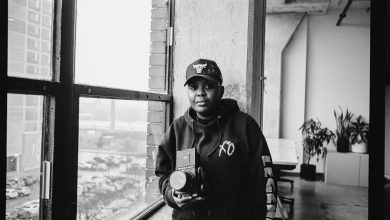Portfolio Websites — Build or Buy?
Podcast: Download (Duration: 17:37 — 20.2MB)
In this episode, I chat with web designer Alex Vita. We talk about web design and website galleries – as they apply to photographers.Connect with Alex: http://www.foregroundweb.com
This Week in Photo: http://www.thisweekinphoto.com
Free Elementor Course: Building a Portfolio Website
Transcript:
Hey, welcome back to another episode. This is Frederick Van Johnson. Today. We're going to be talking with Alex Vita about galleries, in particular, and websites for photographers. And what are some best-practices for displaying work online and just having everything Bulletproof?
Should you go with a roll your own solution, like WordPress and install, awesome plugins into it, or should you just, pay a subscription fee to a Squarespace or someone like that and have it all managed by third-parties in the cloud here to demystify all that is Alex Vita.

Alex is a Romania-based web designer who knows pretty much everything there is to know about web design and photography, as it applies to websites and galleries. And we're going to pick his brain today.
Alex, welcome to the show, man. How are you doing?
Alex: Hi. Frederick nice to meet you. Happy to be here.
Frederick: Nice to meet you too. Are you ready for this? I got a ton of questions for you.
Alex: I'm ready. Go ahead. I'm an open book.
Frederick: Cool. All right, let's start with chapter one of that open book. who is Alex Vita? How did you get started in all this? And how did you start building your niche in web design and gallery design for photographers?
Alex: I started as an amateur photographer myself. I had a photo studio, I shot a few weddings, a few portraits sold some stock images. So that's how I got introduced to the field of photography. But I have a degree in computer science and I started building websites for a few photographers and that grew over time. And now I'm doing only that I have web design services exclusively for photographers, and I'm enjoying every minute of it and having to do work only with photographers. Over time, I started learning the nuances of the industry. It's a bit different than building generic websites, I think.
Frederick: One of the big questions that come up for a lot of photographers is should I invest my time and effort in learning WordPress and putting it, finding a great premium theme and putting it on there and, owning it all.
Or is it better to go to a Squarespace solution? As a web designer, where do you fall on that? Is it budget based? Is it skillset based or something else?
Alex: I'll try to avoid “it depends”. And try to offer some pointers here – it's all a game of compromises. I like WordPress, I think it's the big elephant in the industry, right? It powers a third of the Internet for good reason. And there are dedicated photography platforms out there, which photographers have been using for a long time, the big players, SmugMug, PhotoShelter, and the other ones.
And I feel they are all sensing the heat from WordPress. There's a good level of competition now because WordPress is so powerful. You get a great theme, some plugins and you have good functionality, a great looking, mobile-friendly portfolio. So the decision then comes down to a few factors, right?
Tiebreakers. One would be your stage of the business. If you're a beginner versus a pro, and what type of website you need, do you just need a portfolio website just to showcase images, a few sets of images to show you the quality of your work, or do you need the advanced functionality?
E-commerce right selling prints out of fulfillment, selling licenses, selling photo-based products, calendars, and photo tours, and that sort of stuff. Do you need advanced blogging functionality and other stuff? Those details all matter in this decision, it's like I said, it's a game of compromises. Most people, listening to this, watching this, I think WordPress is good.
It's more complex for some people that are not very tech-savvy. You can really get lost at some point, with all the theme options and plugins. If you don't do maintenance and all of that, but it's more powerful. There's a huge community behind it. It allows you to grow the website in the future.
So, I think it's a good foundation. Too often I get emails from clients, from photographers coming to me saying that they. Use some sort of template. They use Wix or Squarespace, or they used WordPress, but paid photographers theme or something. It looks really pretty out of the box. Their demos look amazing, but they come to me saying, Hey, I want to change this. Why can't do that in the theme options, because it's limited you just get what you get?
Frederick: There are the dedicated services out there, like the Zenfolio, and Pixieset, Smugmug, et cetera, that let you put a gallery up there. It's really interesting what you said about the lure of a beautiful WordPress theme looks great. you look at the demo, it looks beautiful. But then you get it, you install it. And you're like, this is perfect, except for this one thing right there. If I could just do this, and then they call Alex, and then you have to go in and hopefully do some surgery. The question and this is coming from experience. I've been on WordPress for a decade or so for the This Week in Photo site. And what I learned over the years is I was forced into becoming WordPress savvy through starting where you were, where like you said, okay, I have this theme and then going in and trying to fix it. Then I found out, okay, now I got to learn this stuff and I got to learn CSS.
And, maybe I should use a child theme instead of the main theme. And then it just goes on and on. And then when you finally have it set. Then WordPress revs or the plugins update and now things break and you got to go in and fix it and all that stuff. So, it's it with great power comes great responsibility.
So it is good that you could do everything, almost anything with WordPress, but at the same time, you got to stay on top of it all the time and make sure that it's working. You got to be that guy versus going out and shooting or marketing.
Alex: So it's that trade-off between design, flexibility, and power. And the cost of that complexity is not worth it to everyone. I have a bias towards WordPress. I enjoy using it. And like you said, I learned all the ins and outs and maintenance and all of that. But when I start communicating with, a new photographer. I just ask them what they need, because if they just needed a simple portfolio-based website, just to showcase a few images, it might be too much for them.
if they do make this decision, if someone, takes the decision not to go on the WordPress site, not to go too complex. They run the risk of choosing a template that's being used by thousands of other photographers because it's a template. Because you're just picking a theme and you have little design flexibility with it.
So they really need to do a lot of due diligence, they need to test it out to make sure the demos are good to test it out on mobile, and then to customize as much as possible out of it. So they don't look like thousands of other websites using the same template. I see such websites, especially with photography platforms. They pick a template from PhotoShelter, SmugMug, or Zenfolio. And then there are hundreds of websites that look the same. They have a different logo, but then they're identical. So we come to that marketing thing. How do you stand out from the crowd? And the industry is saturated, but you have the exact same website as other ones. So it's difficult.
Frederick: If you go with a minimalist type theme though, does it matter if someone else has the same theme, ideally, the website design is overshadowed by the work, right? So people aren't looking at, Oh, Hey, he used the three up the grid. And so did that guy over there. They should be looking more at the photos themselves. Where do you fall on that? Should the design of the site showcase the work itself?
Alex: I completely agree that the web design should not stand in the way of someone browsing the website and, admiring the photos.
Images always matter most so definitely, especially for a portfolio. A few galleries hosted on a website? Definitely, if the template is minimalistic and the images shine that's enough. Of course, that would be similar to other websites. What I was referring to more was, pro photographers, needing, more advanced websites, if they need e-commerce or other functionality, then they usually cannot just go with a simple template-based website.
They need WordPress and plugins and sometimes they even need to integrate different platforms. It happens like a hybrid website. You use WordPress for the blog and the static pages, the content, but then you use a different platform just for your archive, for selling images and prints, and all of that. And you try to customize them. So they feel part of the same website.
Frederick: The other side of the coin is a website even necessary these days. I really want to get your thought on this because you're a designer and you sit in the middle of this and you have clients. I've been hearing increasingly from models and photographers, usually younger, on the younger side that, Hey, I don't even have a website. Here's my Instagram. I do everything through Instagram, message me through Instagram. I don't even have a .com website, or if I do, it points at the Instagram profile.
As a professional web designer that's doing work in the photography niche, where do you fall on the whole Instagram argument?
I just see social media platforms as great tools, great marketing tools, but just that I see them as great instruments to raise awareness, to spread your message.
Alex: But I just don't like photographers to set their Homebase there and not have a website at all. It just feels like Social media sites just come and go. They get acquired. They get closed down. It happens. many years ago there were a lot of photographers just having a Flickr account. If you remember that, they didn't have a website. They just send you their Flickr profile and now it's Instagram and it could be something else in the future. That all changes, whereas a website is an asset that you control, that you own and you own the content and you control it. It's owning a house versus renting it. that's my attitude toward social media websites.
I think they're great there, but they're just tools that you can leverage to grow your business. Not build everything on it. I don't think photo buyers or your clients or target audience treats you very seriously or sees you as an expert if you just send them an Instagram and not a website.
Frederick: And when you rent, you're subject to the rules of the landlord, in the digital world, it's the terms of service. If you breach the terms of service, because whoever may not like your particular genre of photography, then they can shut you down or penalize you in some way.
Whereas if you own your own, you own your own, right?
Alex: Exactly. They changed the rules on you and you can do nothing about it. Just like Facebook. How you can no longer reach people's feeds, you have to promote and pay for that. It's the same thing.
Frederick: Some photographers just want to show their work. Some photographers want to show their work and get comments on their work. Some photographers want to put a gallery up there to have people download images, say for wedding proofs or something like that. Others want to sell fine art. What's a good place for a photographer to start? If they've been in photography for a couple of years and they figured out, yes, this is what I want to do. And now it's time for me to take it up a level. Where should they go?
Should they start with someone like you? And have you consulted with them on what to do? Or should they just, go sign up for an account somewhere and start uploading images? What's the best way to go?
Alex: Whether they hire a web designer or a consultant, or they do research on their own they do need to research. There are a plethora of tools out there, all having some sort of e-commerce functionality. But if you get down into the details, I know that the differences and they're not all built the same, it really depends on what they need. So prints; you can sell self-fulfilled prints on WordPress too, with WooCommerce or with Nextgen gallery, or other plugins.
But you have to do the work. If you're looking for automatic fulfillment, like the order goes to the print lab directly and it gets shipped to the client directly, then your options are… limited, you have Nextgen Gallery, I think they've just introduced automatic fulfillment or you use different platforms like PhotoShelter, SmugMug and all the other ones. With licenses, if you want to sell downloads, which is a common scenario, again, WordPress, but it depends on your archives. If we're just talking tens or hundreds of images, a small selection of fine art images, WordPress purpose is manageable to do that. But if you have a stock archive or you have thousands of images, it's not. WordPress is too cumbersome for that. So you use a dedicated platform again, and even then you have to do research.
Because licenses are not all the same. You have royalty-free versus rights managed, not all platforms have rights-managed calculators. So truly depends. They might need a consultant or just a lot of time to research.
Frederick: So if, from a consultancy standpoint if a photographer comes to you and they say, I need; a world-class website built. I want, pages that do this and this, and I want a world-class gallery and I need e-commerce on there, et cetera. What are they looking at generally, in terms of, a price range?
Alex: For simpler portfolio websites, that can be done just on a WordPress installation or some other tool, like a template. it's not that expensive. one thousand, two thousand, three thousand dollars. It depends on the details, where it starts to get expensive from my experience, is when they need all that advanced functionality and a lot of customization, integrating two platforms, like I said, in a hybrid website, WordPress plus something else and both customized to match. So it feels like part of the same website. And more testing and more advanced SEO and all that stuff. My project can reach up to nine, $10,000. It depends that can get crazy expensive or for stock archives, but for solo photographers, just for a portfolio website, it's usually simpler.
Frederick: Then what about the photographer? Photographers already have a website set up and they just need help refining it, say with SEO or something like that. Is that something that you offer?
Alex: Over time I added those types of services just by sheer demand.
I do website reviews. I just do an audit or review of the existing website and make them a list of recommendations or suggestions from scratch. I have SEO reviews, or what I call “website make-overs” where they don't really need a new website from scratch. Whether that's too expensive or too complex for them.
I just go in and try to polish their existing website. I go page by page manually tweak the design, clean up the admin area, and just make everything user-friendly if their existing platform is good enough. If it can be salvaged.
Frederick: So it's in the real estate analogy, here's this house, the foundation is good and the framing is good. We're just gonna put paint on it or change that wood out for brick or something like that. Sometimes you need to demolish the building and start over. You gotta take it down to dirt and start again.
So if people want to see some of the stuff that you're working on, or, contract you or otherwise reach out to you, what's the best way to contact you online.
Alex: My website is foregroundweb.com, F O R E ground web.com. I have a ton of articles there, resources, courses, and a list of all the web design services that I offer. Basically, it's all about photography, websites, nothing else. They can check it out and I'm open to getting emails from clients if they have questions.
Frederick: All right, Alex Vita thank you for coming on today. I appreciate your time.
Alex: Happy to be here. Thanks.








You must be logged in to post a comment.